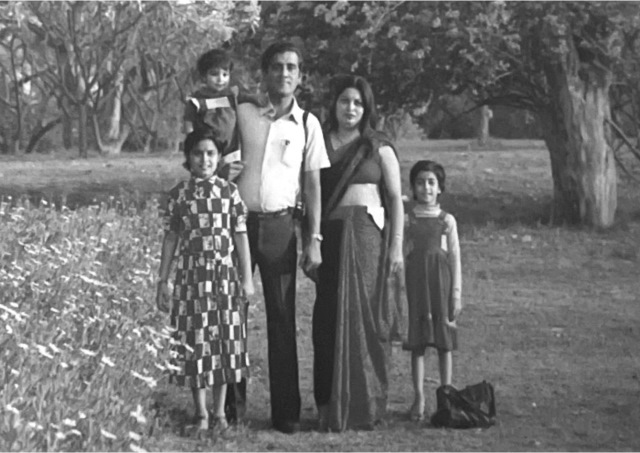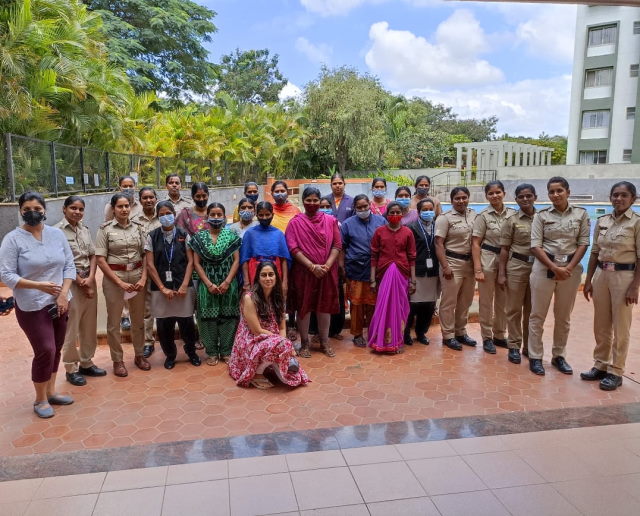2022-April-25
Did you know? You can share this story using the social media icons on the upper left. Use the hashtag #WeAreCisco. You can also rate or comment on the story below.
Be the Change: A Story of Social Justice
BY SHILPA BATRA · PEOPLE CONSULTANT · INDIA
WITH HELEN GALL
5 MINUTE READ · 8 MINUTE LISTEN
Editor’s Note: The following story involves a discussion about abortion and domestic violence, which might be upsetting to some readers.
I was born in New Delhi to middle-class working parents whose first child was a daughter. When my mom delivered her second child, me, it meant life would be tough for my parents with two girls. Later, my parents welcomed their third child, also a girl.

That was when 80 percent of people in India lived in rural areas. And when clean water, education for girls, and permission for girls to leave home after 6 p.m. was considered a massive sign of privilege and modernization.
Although we lived in the city, I had heard stories of female feticide — sex-selective abortion of female fetuses — which was not uncommon in India at that time. The second-class status of women was still prevalent. I read about barbaric acts of domestic violence, dowry, and honor killings in the news.
Despite all odds, and a potentially daunting future, my parents decided to raise their girls in a way that all three of us could be proud of our lives.
We took every ounce of life that came our way, challenges and triumphs alike.
In hindsight, it is scary to think that had I been born in one of India’s rural villages, one of those many unfortunate fetuses could have been me.
My childhood was immersed in values like equality, social justice, and respect for every life form.
But there was constant contradiction in my mind. I realized the inequality of genders still loomed at large.
Conforming to the real world brought out the rebel in me. I constantly wrestled with the question, “How can gender be the basis of judgments being passed about capabilities and intelligence?”
Fast forward 15 years: Something shook my core
The life support for a working woman in India like me — someone I couldn’t live without — is my domestic helper.

During the morning rush, we often share the kitchen space. A few times, I’ve noticed purplish-blue bruises on her cheekbones and forehead, burns around her wrists, or a slight limp.
Once, when I gently asked her about the bruises on her forehead, the flood gates opened. She shared the horrifying story of persistent domestic violence, involving physical and mental abuse, she endures from her husband.
Her son and daughter, ages 10 and 13, have grown up witnessing their mother beaten and tormented almost every day, sometimes for petty reasons or just out of habit.
She’d never questioned her husband’s behavior as she’d seen her mom and many other women in her community suffer similar treatment. She believed it was part and parcel of being born as a woman.
Like many others in lower-middle-class families, her children are exposed to domestic violence and abuse in their early years. They develop anxiety, depression, and low self-esteem. With no proximity to educated society, many think this is normal and grow up to be victims or perpetrators themselves.
In the lower socioeconomic strata, lack of education and the subsequent oblivion to rights makes domestic violence and abuse even more common.
I knew this barbarism of domestic violence had to stop so next generations could live life with dignity and confidence. But the question was how?
I started researching this social stigma
Domestic violence is the leading cause of injury to women. More so than car accidents, muggings, and rapes combined. It’s evident, to some degree, in every society in the world.
Globally, domestic violence affects people of all genders, most commonly in developing countries. Even in countries like the United States, this is still the case. The World Health Organization reports between 15 and 71 percent of women in a relationship experienced physical or sexual violence by their intimate partner.

Taking action
Thanks to Time2Give, I learned about the Chenamma squad, a unit of women police, called Hoysala, in pink patrolling vans in Bangalore. They do an incredible job of preventing crime against women. They also provide free counseling for women experiencing domestic abuse.
I met one of the Chenamma squad and presented the need for education and enforcement of laws against domestic violence. They specifically focus on women working as domestic workers, cooks, and construction laborers, who are often unaware of their rights or the judicial system.
They agreed to team up. We utilized the festive season in India to invite these women to a session over tea and snacks. Thanks to an informal setup, we had a good turnout. The Chenamma squad helped educate women on their rights, provided helpline numbers, and shared the process to ensure safety and pursue justice when needed.
The session also covered how women can educate their children and save them from the effects of domestic abuse and violence. A few courageous women shared their stories of suffering and years of abuse. There were many tears.
The ripple effect
As we wrapped up the session, there was a glow of hope on these women’s faces. They had new determination to stand for their pride and dignity and that of their children.
Life has its own way of teaching us that if a problem is solved only for yourself, it’s not actually solved at all. Domestic violence is not just an individual or even a family issue, but a problem with negative consequences on society. When women are educated, economies are stronger and do better.
I hope these sessions can be a ripple effect in larger communities, and we see much-needed change.
I am grateful that Cisco’s Time2Give has allowed me to feel a sense of community with these empowered women. Paying it forward is an important way to power an inclusive future for all. It’s given me the opportunity to do something positive in my community.
Related Links
Connect everything. Innovate everywhere. Benefit everyone.
Share your thoughts!
Log in to rate and commentShare your thoughts on the story here!